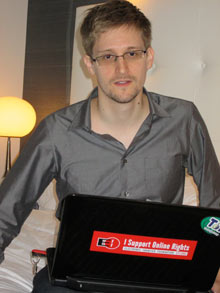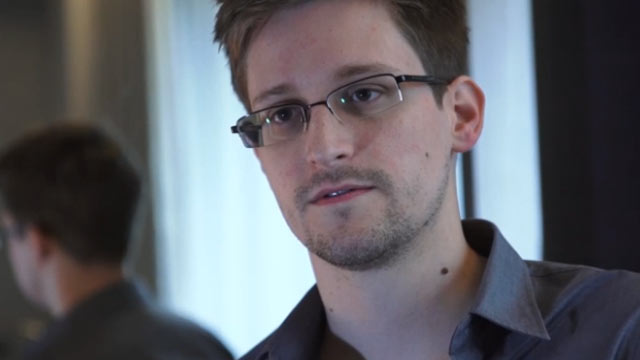Edward Snowden was interviewed over several days in Hong Kong by Glenn Greenwald and Ewen MacAskill.
Q: Why did you decide to become a whistleblower?
A: "The NSA has built an infrastructure that allows it to intercept almost everything. With this capability, the vast majority of human communications are automatically ingested without targeting. If I wanted to see your emails or your wife's phone, all I have to do is use intercepts. I can get your emails, passwords, phone records, credit cards.
"I don't want to live in a society that does these sort of things … I do not want to live in a world where everything I do and say is recorded. That is not something I am willing to support or live under."
Q: But isn't there a need for surveillance to try to reduce the chances of terrorist attacks such as Boston?
A: "We have to decide why terrorism is a new threat. There has always been terrorism. Boston was a criminal act. It was not about surveillance but good, old-fashioned police work. The police are very good at what they do."
Q: Do you see yourself as another Bradley Manning?
A: "Manning was a classic whistleblower. He was inspired by the public good."
Q: Do you think what you have done is a crime?
A: "We have seen enough criminality on the part of government. It is hypocritical to make this allegation against me. They have narrowed the public sphere of influence."
Q: What do you think is going to happen to you?
A: "Nothing good."
Q: Why Hong Kong?
A: "I think it is really tragic that an American has to move to a place that has a reputation for less freedom. Still, Hong Kong has a reputation for freedom in spite of the People's Republic of China. It has a strong tradition of free speech."
Q: What do the leaked documents reveal?
A: "That the NSA routinely lies in response to congressional inquiries about the scope of surveillance in America. I believe that when [senator Ron] Wyden and [senator Mark] Udall asked about the scale of this, they [the NSA] said it did not have the tools to provide an answer. We do have the tools and I have maps showing where people have been scrutinised most. We collect more digital communications from America than we do from the Russians."
 Snowden is a 29-year-old former technical assistant for the CIA
Snowden is a 29-year-old former technical assistant for the CIA
Q: What about the Obama administration's protests about hacking by China?
A: "We hack everyone everywhere. We like to make a distinction between us and the others. But we are in almost every country in the world. We are not at war with these countries."
Q: Is it possible to put security in place to protect against state surveillance?
A: "You are not even aware of what is possible. The extent of their capabilities is horrifying. We can plant bugs in machines. Once you go on the network, I can identify your machine. You will never be safe whatever protections you put in place."
Q: Does your family know you are planning this?
A: "No. My family does not know what is happening … My primary fear is that they will come after my family, my friends, my partner. Anyone I have a relationship with …
I will have to live with that for the rest of my life. I am not going to be able to communicate with them. They [the authorities] will act aggressively against anyone who has known me. That keeps me up at night."
Q: When did you decide to leak the documents?
A: "You see things that may be disturbing. When you see everything you realise that some of these things are abusive. The awareness of wrong-doing builds up. There was not one morning when I woke up [and decided this is it]. It was a natural process.
"A lot of people in 2008 voted for Obama. I did not vote for him. I voted for a third party. But I believed in Obama's promises. I was going to disclose it [but waited because of his election]. He continued with the policies of his predecessor."
Q: What is your reaction to Obama denouncing the leaks on Friday while welcoming a debate on the balance between security and openness?
A: "My immediate reaction was he was having difficulty in defending it himself. He was trying to defend the unjustifiable and he knew it."
Q: What about the response in general to the disclosures?
A: "I have been surprised and pleased to see the public has reacted so strongly in defence of these rights that are being suppressed in the name of security. It is not like Occupy Wall Street but there is a grassroots movement to take to the streets on July 4 in defence of the Fourth Amendment called Restore The Fourth Amendment and it grew out of Reddit. The response over the internet has been huge and supportive."
Q: Washington-based foreign affairs analyst Steve Clemons said he overheard at the capital's Dulles airport four men discussing an intelligence conference they had just attended. Speaking about the leaks, one of them said, according to Clemons, that both the reporter and leaker should be "disappeared". How do you feel about that?
A: "Someone responding to the story said 'real spies do not speak like that'. Well, I am a spy and that is how they talk. Whenever we had a debate in the office on how to handle crimes, they do not defend due process – they defend decisive action. They say it is better to kick someone out of a plane than let these people have a day in court. It is an authoritarian mindset in general."
Q: Do you have a plan in place?
A: "The only thing I can do is sit here and hope the Hong Kong government does not deport me … My predisposition is to seek asylum in a country with shared values. The nation that most encompasses this is Iceland. They stood up for people over internet freedom. I have no idea what my future is going to be.
"They could put out an Interpol note. But I don't think I have committed a crime outside the domain of the US. I think it will be clearly shown to be political in nature."
Q: Do you think you are probably going to end up in prison?
A: "I could not do this without accepting the risk of prison. You can't come up against the world's most powerful intelligence agencies and not accept the risk. If they want to get you, over time they will."
Q: How to you feel now, almost a week after the first leak?
A: "I think the sense of outrage that has been expressed is justified. It has given me hope that, no matter what happens to me, the outcome will be positive for America. I do not expect to see home again, though that is what I want."

7 comments:
Our hero?
"Our hero?"
Well, let's consider what he said:
"A lot of people in 2008 voted for Obama. I did not vote for him. I voted for a third party. But I believed in Obama's promises. I was going to disclose it [but waited because of his election]. He continued with the policies of his predecessor."
No. This demented souless nerd demonstrated he willfully protected Obama, the manchurian candidate.
He also states:
"
"You are not even aware of what is possible. The extent of their capabilities is horrifying."
Feh. With what we know, suspect and anticipate about this manchurian candidate, . . .how much more horrifying can it get?
Edward Snowden, protecting this fraud is equally responsible for the horrors that will befall this nation because he is only out to save his own skin. I have no pity for him. I offer no thanks for his 'leaks'.
I offer no wishes for either 'ill fate' or 'good fortune' for him. He's a coward that pretends to be a hero.
C'est la vie.
I don't have much more faith in him than you do.
All that matters to me is the secret is out.
Sometimes you get the sweetest honey from the most rotten trees.
All that matters to me is the secret is out.
Sometimes you get the sweetest honey from the most rotten trees.
Lol, exactly what I was thinking.
Quote: "Still, Hong Kong has a reputation for freedom in spite of the People's Republic of China. It has a strong tradition of free speech."
Sure, of course, China (er, Hong Kong)has a long history of generous superbenevolence toward disgruntled (ex)NSA fugitives.
http://canadafreepress.com/index.php/article/55749
“this is bigger than you can imagine, bigger than anyone can imagine. This administration is collecting names of sources, whistle blowers and their families, names of media sources and everybody they talk to and have talked to, and they already have a huge list. If you’re not working for MSNBC or CNN, you’re probably on that list. If you are a website owner with a brisk readership and a conservative bent, you’re on that list. It’s a political dissident list, not an enemy threat list,” he stated.
Post a Comment